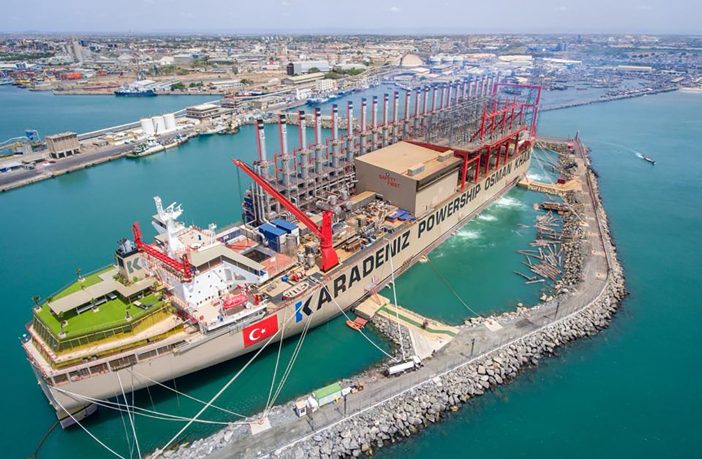- Last year, the National Prosecuting Authority (NPA) declined to bring criminal charges against consultants hired by Karpowership South Africa for attempting to bypass environmental laws.
- In disclosing its reasons, the NPA revealed that a key government official alleged the consultants told him the Department of Mineral Resources and Energy was aware of Karpowership’s controversial plan.
- The consultants denied this and the NPA found their denial credible, but now amaBhungane is attempting to test the NPA assessment by requesting access to the docket prepared by the Green Scorpions.
The state will not prosecute Karpowership’s environmental consultants because the case hinges on a single witness, according to advocate Sibongile Mzinyathi, the director of public prosecutions in Pretoria.
The case was opened in May 2021 by the Environmental Management Inspectorate, aka the Green Scorpions, who alleged that Karpowership’s consultants misled a chief director in the Department of Forestry, Fisheries and the Environment (DFFE) in order to obtain an exemption from South Africa’s strict environmental laws.
But according to Mzinyathi, there was “no reasonable prospect of a successful prosecution” because it the case relied on the testimony of a single witness: the DFFE’s chief director of compliance Sonnyboy Bapela.
“So, in this case we are dealing with the evidence of a single witness and in criminal law there are stringent rules applied by our Courts when the State’s case relies on the evidence of a single witness,” Mzinyathi told amaBhungane in a written response.
But in revealing why the National Prosecuting Authority (NPA) will not prosecute the case, Mzinyathi also revealed another intriguing detail: the Department of Mineral Resources and Energy (DMRE) may have known about Karpowership’s controversial plan to skirt environmental laws.
“No emergency”
In June 2020, David Mabunda – the former CEO of SanParks, now an environmental consultant – approached Bapela with an urgent request: the country was in the grip of a pandemic and an electricity emergency; his client Karpowership South Africa could supply emergency power to ensure an uninterrupted supply to the healthcare sector, but only if it was granted an exemption from complying with the National Environmental Management Act (Nema).
Section 30A of Nema is only meant to be used in emergency situations when quick action can save lives or prevent an even greater environmental disaster.
Normally, Karpowership’s floating power plants would not qualify, but the NPA says Bapela’s version was that “one of the contributing factors in issuing the Verbal Directive [i.e. exemption] was that, Prof D Mabunda informed him that they, i.e. Triplo4 Sustainable Solutions for Karpowership, had consulted with the Department of Mineral Resources and Energy with regards to their application for a directive or authorisation to generate electricity.”
It is not clear exactly what was said – the application was made verbally and no recording exists – but Bapela was evidently convinced that Karpowership would be able to immediately supply power to the grid and keep hospitals and ventilators running.
The same day, he granted the company an exemption from complying with the costly and lengthy environmental impact assessment process.
Two months later, however, the department withdrew the exemption, saying “there was in fact no emergency situation”.
This, however, is where the case gets murky.
According to Mzinyathi, Karpowership’s lead environmental consultant Triplo 4 Sustainable Solutions and its director Hantie Plomp deny that they spoke to the DMRE:
“In the media … Triplo4 stated that they never consulted or negotiated with any government entity at the time they applied for the Verbal Directive. Triplo4 then also denies having informed the Chief Director as stated and all the documents they submitted in the [subsequent]application process, corroborates their denial.”
We asked the DMRE for comment but have not received a response.
Smoothing the way
It would be significant if DMRE had been smoothing the way for Karpowership in June. Two months later, the DMRE’s IPP office released a tender for the Risk Mitigation Independent Power Producer Procurement Programme (RMI4P).
The tender was widely interpreted as being written to favour gas projects and Karpowership in particular.
- Read Powerships: How the tender kneecapped renewables and favoured gas and Powerships: How the multi-billion-rand tender was (legally) rigged
In withdrawing Karpowership’s exemption, DFFE spokesperson Albi Modise said: “It has subsequently emerged that the company had applied for the verbal directive in advance, in preparation for the possible implementation of the government’s integrated resources plan and in the event that the company would be selected as an emergency power producer.”
This is a small extract from a very in depth and well researched article written by for the amaBhungane Centre for Investigative Journalism.
Read more on this exclusive story from the amaBhungane Centre for Investigative Journalism HERE

















